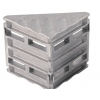Spring Festival is the most important holiday for Chinese people. Excitement and happiness are palpable this time of the year, and they reach the peak on lunar new year's eve.
Now we are talking about the customs of the Spring Festival.
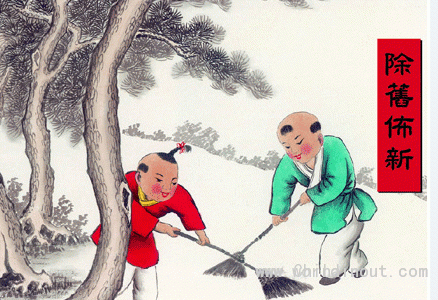
Sweeping the Dust
“Dust” is homophonic with “chen”(尘)in Chinese, which means old and past. In this way, “sweeping the dust” before the Spring Festival means a thorough cleaning of houses to sweep away bad luck in the past year. This custom shows a good wish of putting away old things to welcome a new life. In a word, just before the Spring Festival comes, every household will give a thorough cleaning to bid farewell to the old year and usher in the new.
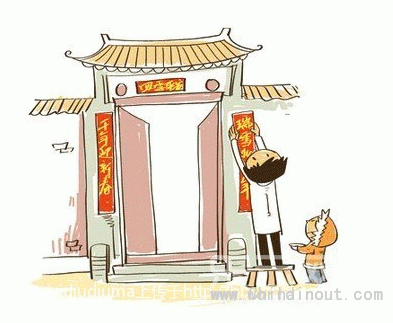
Pasting Spring Couplets
“The Spring Couplet”, also called “couplet” and “a pair of antithetical phrases”, is a special form of literature in China. The Spring Couplet is composed of two antithetical sentences on both sides of the door and a horizontal scroll bearing an inscription, usually an auspicious phrase, above the gate. The sentence pasting on the right side of the door is called the first line of the couplet and the one on the left the second line. On the eve of the Spring Festival, every household will paste on doors a spring couplet written on red paper to give a happy and prosperous atmosphere of the Festival. In the past, the Chinese usually wrote their own spring couplet with a brush or asked others to do for them, while nowadays, it is common for people to buy the printed spring couplet in the market.
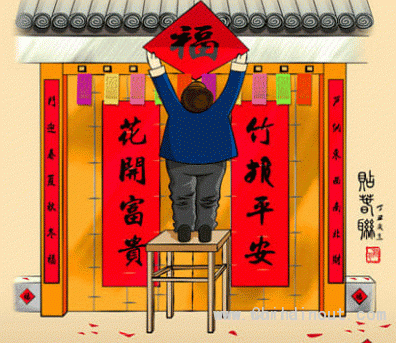
Pasting Paper-cuts and “Up-sided Fu”
Paper-cuts, usually with auspicious patterns, give a happy and prosperous atmosphere of the Festival and express the good wishes of Chinese people looking forward to a good life. In addition to pasting paper-cuts on windows, it is common for Chinese to paste the character “fu(福)”, big and small, on walls, doors and doorposts around the houses. “Fu(福)” shows people’s yearning toward a good life. Some people even invert the character “fu(福)” to signify that blessing has arrived because “inverted” is a homonym for “arrive” in Chinese. Now many kinds of paper-cuts and “fu(福)” can be seen in the market before the Festival.
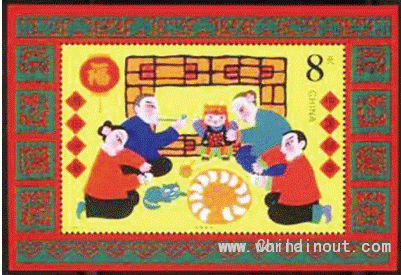
Staying Up Late on New Year's Eve
The tradition of staying up late to see New Year in originated from an interesting folk tale. In ancient China there lived a monster named Year, who was very ferocious. Year always went out from its burrow on New Year’s Eve to devour people. Therefore, on every New Year’s Eve, every household would have supper together. After dinner, no one dared go to sleep and all the family members would sit together, chatting and emboldening each other. Gradually the habit of staying up late on New Year’s Eve is formed. Thus in China, “celebrating the Spring Festival” is also called “passing over the year (guo nian)”. However, now there are less and less people in cities who will stay up late to see New Year in.
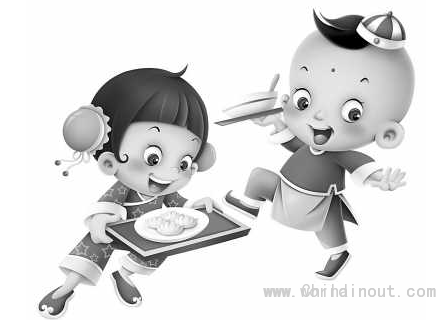
Having Jiaozi
On New Year’s Eve, the whole family will sit together to make jiaozi and celebrate the Spring Festival. The shape of jiaozi is like gold ingot from ancient China. So people eat them and wish for money and treasure. The tradition of having jiaozi is very important during the Spring Festival. You cannot have a complete Spring Festival without having jiaozi.

Setting off Firecrackers
The firecracker is a unique product in China. In ancient China, the sound of burning bamboo tubes was used to scare away wild animals and evil spirits. With the invention of the gunpowder, “firecracker” is also called “鞭炮biānpào” (“炮” in Chinese means gun) and used to foster a joyful atmosphere. The first thing every Chinese household does is to set off firecrackers and fireworks, which are meant to bid farewell to the old year and usher in the new.
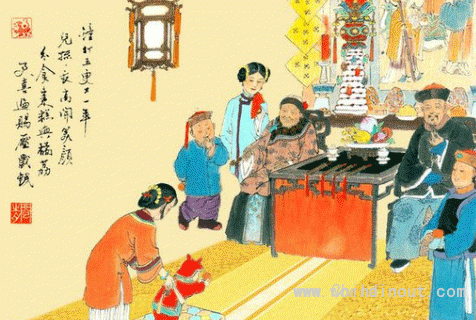
New Year's Visit and Gift Money
On the first day of the Chinese lunar year, everybody puts on their best clothes and pays ceremonial calls on their relatives and friends, wishing them all the luck in the coming year. Juniors will greet seniors, wishing them health and longevity, while seniors will give juniors some gift money as a wish for their safety in the coming year.
Traditional Festival Greetings:
恭贺新禧 | Happy New Year
吉祥如意 | Everything Goes Well
恭喜发财 | Wishing You Prosperity
年年有余 | Surplus Year after Year
岁岁平安 | Peace All Year Round
新春大吉 | Good Luck in the New Year





